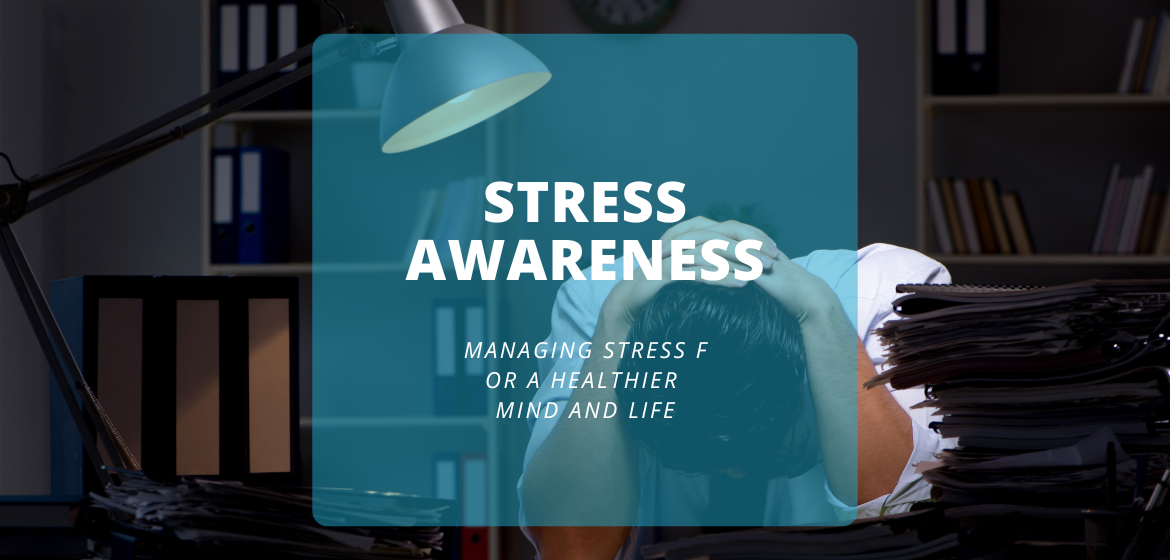
Stress Awareness: Managing Stress for a Healthier Mind and Life
The concept of stress, defined as the body’s response to challenging or threatening situations, is an essential aspect of human functioning. While acute stress can enhance focus and motivate action, prolonged or chronic stress has been linked to numerous negative health outcomes. As it becomes an increasingly prevalent issue among college students and the general population, addressing and managing stress effectively is a priority within the field of mental health.
November, recognised as Stress Awareness Month, provides an opportunity to deepen our understanding of stress and promote effective management strategies. This article reviews stress’s psychological and physiological impacts, early signs, and research-backed interventions.
Understanding Stress: Physiological and Psychological Impact
Stress triggers a complex interaction between the brain and body, primarily through the hypothalamic-pituitary-adrenal (HPA) axis. When exposed to stressors, the HPA axis releases hormones such as cortisol and adrenaline, preparing the body for a “fight or flight” response. While beneficial in short bursts, chronic stress can lead to sustained elevations in cortisol, impairing immune function, cardiovascular health, and cognitive performance.
Psychologically, stress contributes to emotional strain, diminished cognitive function, and decreased coping ability, often resulting in a cycle of mental fatigue and physical depletion. It has also been linked to severe mental health conditions, including anxiety disorders, depression, and burnout. Understanding these impacts emphasises the importance of managing it to prevent long-term health consequences.
Signs of Chronic Stress and Early Intervention
Identifying signs early is crucial to prevent it from evolving into chronic conditions. The following symptoms often indicate elevated stress levels:
- Physical Symptoms: Headaches, muscle tension, gastrointestinal disturbances, fatigue, and insomnia.
- Emotional Symptoms: Anxiety, irritability, mood instability, and feelings of being overwhelmed.
- Behavioural Symptoms: Changes in sleep or eating habits, social withdrawal, and reliance on substances as coping mechanisms.
Addressing it at its initial stages through intervention and coping strategies can mitigate further escalation and promote long-term mental health resilience.

Identifying signs early is crucial to prevent stress from evolving.
Evidence-Based Management Strategies
To effectively manage stress, research in psychotherapy and psychology suggests a range of evidence-based approaches. This section outlines strategies that have been shown to alleviate issues and support mental health.
- Developing Daily Techniques:
- Mindfulness-Based Stress Reduction (MBSR): Mindfulness practices such as body scan, meditation, progressive muscle relaxation, and controlled breathing have been shown to reduce symptoms by promoting relaxation and enhancing emotional regulation. Studies show that MBSR improves cognitive functioning and reduces physiological markers.
- Physical Activity: Engaging in regular physical exercise releases endorphins. Aerobic activities like running, yoga, or swimming are particularly beneficial.
- Sleep Hygiene: Stress can disrupt sleep, leading to a feedback loop of increased sensitivity. Evidence supports aiming for 7–9 hours of quality sleep to support cognitive function and emotional resilience. Techniques for enhancing sleep include maintaining a consistent sleep schedule and creating a restful environment.
- Social Connections as a Buffer:
- Building Supportive Networks: Social connections serve as protective factors against stress. Studies show that individuals with strong social support experience lower levels and enhanced mental well-being. Engaging in conversations with friends, family, or support groups can provide emotional relief and constructive perspectives on challenges.
- Setting Healthy Boundaries: While social support is essential, interactions that create conflict or additional stress can exacerbate overall levels. Limiting exposure to negative social interactions is a recommended strategy for mental health maintenance.
- Cognitive Behavioral Strategies
- Cognitive Restructuring: Cognitive Behavioral Therapy (CBT) focuses on identifying and reframing negative or distorted thinking patterns. Research supports CBT’s effectiveness in stress reduction, as it encourages individuals to replace “catastrophic” thinking with balanced, solution-oriented thoughts.
- Problem-Solving Therapy: Rather than focusing on potential negative outcomes, effective stress management involves breaking down problems into manageable steps and developing action plans. CBT and Problem-Solving Therapy encourage a practical approach to stressors, reducing feelings of helplessness and promoting a sense of control.
- Self-Care Practices
- Engaging in Hobbies and Creativity: Research demonstrates the therapeutic effects of engaging in hobbies such as painting, gardening, reading, or music. These activities provide a mental break, fostering positive emotions and reducing overall stress.
- Avoiding Substance Misuse: While substances like alcohol or caffeine may temporarily relieve it, they often exacerbate it in the long term. A focus on balanced nutrition, hydration, and moderation supports both physical and mental health.
Navigating Holiday-Related Issues
With the holiday season fast approaching, it is essential to acknowledge that while this time of year can bring joy, it can also introduce unique stressors. Financial concerns, social expectations, and family dynamics often intensify during this period. The following practices can support you during the holiday season:
- Setting Realistic Expectations: Unrealistic expectations during the holidays can increase stress. Prioritising experiences and relationships that align with personal values is a powerful way to reduce it and promote satisfaction.
- Gratitude Practices: Research on gratitude suggests that focusing on positive aspects of life can shift attention to fulfilling experiences, promoting a healthier mental outlook.
- Financial Planning: To mitigate financial stress, setting a holiday budget can be helpful. Focusing on meaningful connections rather than material purchases is a cost-effective way to maintain well-being during this season.
Conclusion
Stress is an inherent part of life; however, when left unchecked, it can become detrimental to mental and physical health. By identifying symptoms early and implementing evidence-based management strategies, individuals can enhance resilience and reduce the risk of stress-related health issues.























